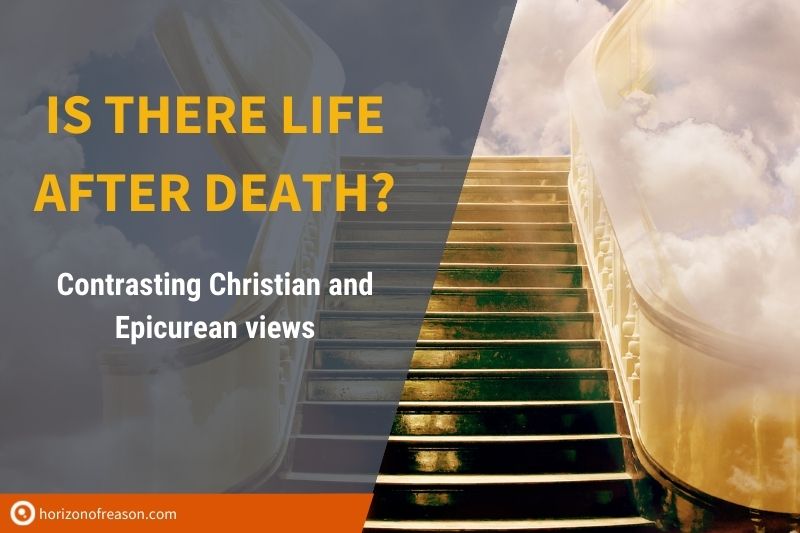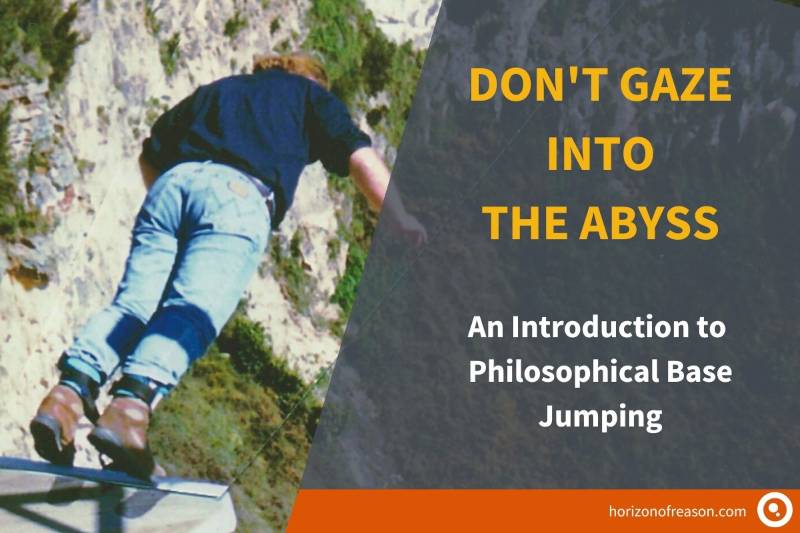
Is there life after death? Christian and Epicurean views

Peter Prevos |
2292 words | 11 minutes
Share this content
Death is not an event of life. Death is not lived through. If by eternity is understood not endless temporal duration but timelessness, then he lives eternally who lives in the present. Our life is endless in the way that our visual field is without limits. Ludwig Wittgenstein, Tractatus Logico-Philosophicus §6.4311.
All of us suffer from the same fatal disease called life. For an estimate of your date of death go to death-clock.org. Many people believe, however, that death is not the end of life, but merely the start of life after death. Belief in life after death is as old as humanity itself. The archaeological record shows that in prehistory, people were buried with personal goods, which is considered evidence that they maintained a belief in life after death.
The topic of this paper is the question of whether, if there is no life after death, our earthly life is meaningless. The problem of whether there is a life after death or not lies outside the scope of this paper. This paper is not about whether the prospect of death causes people to lose meaning; this is a matter for psychologists and sociologists. The topic of this paper is whether the inevitability of death implies that nothing has meaning, as this is a question for philosophers.
Loss of meaning, or meaninglessness, can be interpreted in several ways. Most commonly, meaning is connected to life, or aspects of life, having some intrinsic value. Meaninglessness is, in this case, being deprived of the things we value.
Leo Tolstoy (1828–1910) suffered from a meaninglessness crisis, not by external occurrences, as he was a prosperous and successful author, but because he could not find anything worthwhile in his life.1 Tolstoy writes that because he is fully aware of the fact that life is temporary, he cannot see any value in anything he does and achieves, he thinks that our pleasures in life are mere deceptions, stifling the terror of death. Death, from this point of view, is considered the greatest evil, preventing anything in life from being meaningful. Tolstoy concluded that a religious point of view would be able to provide meaning of life he was searching for because religion promises that there is life after death. At the age of fifty, he converted to Christianity.
Most religious viewpoints hold that death does not remove meaning from life. Religion is in this context an 'afterlife insurance' because securing eternal life is dependent upon assenting to a particular theology. As seen on a sticker in a Hare Krishna restaurant in Eumundi, Queensland. From the Christian point of view, if death is conceived as final, it denies the prospect of eternal life in paradise and the concept of divine reward and punishment. For the religious person, meaning and life after death are therefore inextricably linked. Death is considered evil by those who think that it removes meaning from life.
From most non-religious points of view, the idea of life after death is seen to be a psychological defence against the recognition that death is inevitable and the subsequent denial of meaning. Epicurean philosophers argued that it is not rational to believe that death is evil. Thus the idea that the inevitability of death removes meaning from life becomes a non-rational thought.
In this paper, the Christian point of view will be contrasted with Epicurean philosophy. It will be argued that the non-existence of life after death does not remove meaning from life and that death is essential for life to be meaningful.
Christianity
According to Christian theology, humanity sinned and God punished humankind by removing them from the Garden of Eden. God sent, however, his son Jesus to take the sin of the world on his shoulders, so that anyone who accepts Jesus's sacrifice will be freed from the consequences of their sins.
Christian theology has a linear concept of time; the world is created, we all act out God's plan, and eventually, the world will end, and we will live in eternity with God. This eschatological view of mankind's destiny is essential to Christian theology and is required to make sense of the Christian story of redemption.2 Without the prospect of life after death, earthly life is considered meaningless by Christians. In the first epistle to the Corinthians (15:16–19), Paul of Tarsus (3–67CE) reminds the congregation of the fact that life after death is essential to Christianity (Translated from Koine Greek version):
For if the dead are not raised, neither Christ was raised; and if Christ was not raised, your faith is in vain, and you are within your transgression [you are sinful]. And then the followers of Christ who have fallen asleep will have perished. If in this life alone, we have hope in Christ, we are most pitiful of all men.
Life after death is an essential part of Christianity, and Paul tries to show through reductio ad absurdum that life after death is a reality. If there is no life after death, Paul argues, then Jesus could not have risen from death. If this is not the case, then life is considered meaningless, because Christian faith would be in vain and we can thus not be delivered from our sins. Paul concludes that if the followers of Christ who forget the core doctrine [fallen asleep] will not enjoy eternal life and if we value only our earthly lives, our lives are meaningless [we are most pitiful].
Although Paul's argument that life after death makes life meaningful is a valid deductive inference, the hidden premises are doubtful. Paul's argument hinges on the assumption that Jesus has risen from the dead after being executed by the Romans. Jesus' resurrection is questionable as there is no verifiable evidence for this occurring. Paul's argument shows that, from a Christian point of view, there being no life after death causes loss of meaning, as it negates the whole of theology held valuable by Christians. The argument does, however, not show that loss of meaning follows from the finality of death.
Epicureanism
The Epicureans emphasise that death is complete extinction and that there is no life after death. Epicureanism is based on the atomism of Democritus, which sees the soul as a temporary amalgam of atomic particles, which has no eternal existence.
One of the central tenets of Epicurean ethics is that we should be free of fears and anxieties and that one should not let death ruin your life.3 The Epicurean argument has many features and has been outlined in detail by the Roman philosopher Lucretius (c. 99–55BCE). One line of argument asserts that the state of being dead can not be evil because it is no different from not having been born: (Lucretius, De rerum natura, in: A.A. Long and D.N. Sedley, editors, The Hellenistic philosophers, Volume 2, (Cambridge University Press, 1987b).
… to us there is nothing to fear in death; neither will he who not is, not be able to be in misery; and not something to carry away or not having been born before; when immortal death takes mortal life away.
Lucretius' argument is based on a different concept of time to the Christian point of view. Lucretius assumes symmetry of past and future; not being born and being dead are equivalent. This argument shows the circular concept of time that was adhered to by the ancient Greeks. (Jonkers (1994), p. 85.) The underlying ethical philosophy of Epicureanism is hedonistic. From the hedonistic perspective, pleasure is what makes life valuable; it is the meaning of life.
The Epicurean view of pleasure is broader than our contemporary understanding of hedonism. Pleasure is the cessation of all pain, and the painless state of ataraxia is considered the ultimate pleasure. Epicurus himself argues that any fear becomes irrational when, by its presence, it reduces our pleasure more that if the object of that fear would be realised. Thus, according to Epicurus, death itself does not remove meaning from life, but fear of death. Fear of death is considered not rational by the Epicureans because it threatens us achieving the state of ataraxia.
Long and Sedley show that, although the Epicurean argument shows that mortality is not evil, it does not indicate that death is not evil. For, an untimely death reduces the amount of pleasure somebody would have had otherwise. In Epicurean philosophy, all cessation of pleasure is pain and pain is evil, death should thus, also in Epicurean philosophy, be considered evil.
This objection does, however, not hold because death is the cessation of all pleasure and pain, of all good and evil. The state of being dead can, therefore not be considered evil and can not remove meaning from life. The Epicurean argument shows that from the inevitability of death, it does not follow that life has no meaning, as they place meaning within life itself. This argument does, however, only hold if we agree that pleasure is the ultimate good and provides meaning. The Epicurean argument is, as the Christian argument, only valid when assenting to certain metaphysical underpinnings.
Life After Death
The thought that life has no meaning because we all face certain death is something that every thinking person would have encountered at one stage in their life. Our psychologically innate fear of death can cause us to think there is no value to life, as illustrated by Tolstoy. The Epicurean non-religious view tries to find meaning within earthly life itself through rational argument during the religious point towards a life after death. Religion and philosophy are attempts to give meaning to life when we discover that there is none. They are vehicles for meaning, as outlined in my previous essay. The answer whether the inevitability of death removes meaning from life depends on the metaphysical presupposition of the viewpoint from which the question is answered.
The religious point of view postulates a life after death to provide meaning to life. This approach is, however, not satisfactory because it relocates the problem of whether there is meaning to a life after death.4 The main reason that in religious philosophy, the meaning of life is relocated to an afterlife is that the transcendent has ontological primacy over the immanent material reality. In Christian theology, the spiritual is valued over the material and life after death valued over earthly life. This is something the Epicureans would most certainly not subscribe to, as there is no ontological hierarchy in their world view.
The Epicureans argued successfully that it is not rational to fear death. Still, it is tough to ignore the innate fear of death and the possible subsequent loss of meaning through rational argument. The fear of death is not sound because it can not be inferred through logical argument. This fear is, however, not irrational because it is reasonable to fear the unknown.
Say 'yes' to life!
The Epicureans were right in arguing that death is inconsequential to the question of whether life has meaning or not. Although death may be final and could make all our efforts futile from a perspective of eternity, we can only judge life from the internal perspective. The idea that death only removes meaning is forced upon us when we look upon life from the eternal perspective. One philosopher who argued strongly that the meaning of life could only be found within life itself is Friedrich Nietzsche (1844–1900).
Nietzsche proposes an alternative to the eschatological view of Christianity in a somewhat disturbing thought experiment:5
What, if some day or night, a demon would sneak up to you in your loneliest loneliness and would say to you: "This life, the way you live it now and have lived it, you have to live again and infinitely many more times; and there will be nothing new, because every pain and every lust and every thought and sigh and everything unspeakable small and significant in your life has to happen to you again, and everything in the same order—and also this spider and this moonlight between the trees and also this very moment and myself. The eternal hourglass of existence is eternally turned—and you with it, dust speck in the dust! "
This theory often referred to as the eternal recurrence of the same, is not a theory of what happens. The eternal recurrence is a thought experiment (the occurrence of the demon is hypothetical). The story shows that the life we currently lead is the most important of all. This, in contrast with the Christian point of view in which this life is only a speck in eternity.
Nietzsche wants us to say 'yes' to life. Longing for an afterlife, in which life will finally be given meaning is a denial of our earthly lives. Death is, in fact, inconsequential to the question of whether life has meaning, as death is part of the eternal recurrence of the same. Life only has meaning because it does end. Without death, there is nothing to live for. Without knowing that life will end one day, there is no deadline for our achievements, or as the Angel of Death explained to Piper in an episode of Charmed:
Life only has meaning specifically because there is an end. Death is what forces people to live.
Notes
Leo Tolstoy, ‘My confession', in: E.D. Klemke, editor, The meaning of life, 2nd edition. (Oxford University Press, 2000).
Piet Jonkers, ‘Geschiedenis en vooruitgang (History and progress)', in: Cultuurfilosofie (Philosophy of culture), (Heerlen, the Netherlands: Open Universiteit, 1994).
A.A. Long and D.N. Sedley, editors, The Hellenistic philosophers, Volume 1, (Cambridge University Press, 1987a).
Tim Oakley, Values and the meaning of life, 2nd edition. (La Trobe University, 2002).
Friedrich Nietzsche, ‘Die fröhliche Wissenschaft (The gay science)', in: Das Hauptwerk, (München: Nymphenburger, 1990), Band II.
Share this content


